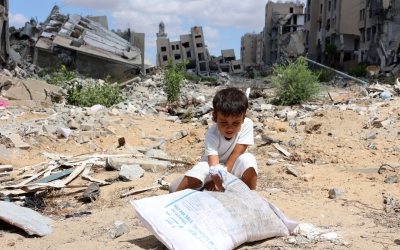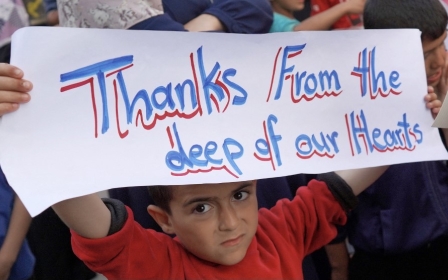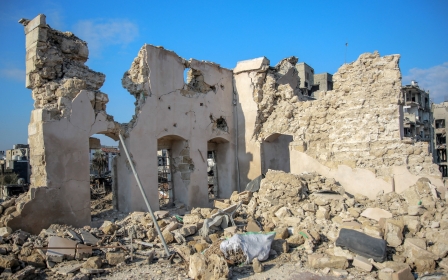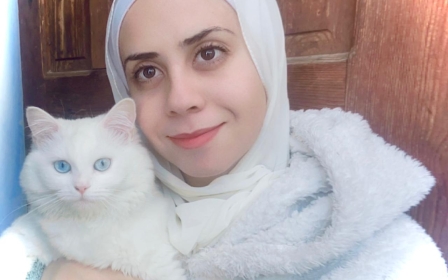Here in Gaza, a new year of hunger, humiliation, and loss begins
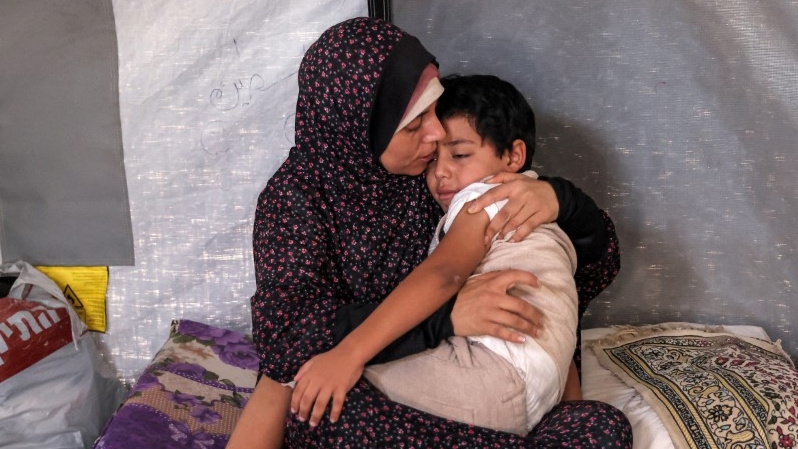
Since the 1948 Nakba, the tent has been a central symbol of the Palestinian narrative, representing displacement and a life of misery.
Tents are meant to be temporary shelters in times of conflict, as we wait and hope that the tragedy will end soon. A prolonged tent life, however - as we have seen since the start of Israel’s genocidal war on Gaza a year ago - suggests that this hope has been shattered.
From the outset of this war, it was clear that mass displacement was a key part of Israel’s plan. The Israeli government swiftly urged hundreds of thousands of Palestinians to leave their homes, instructing those in the north to flee south.
As the army’s massacres intensified, including the destruction of entire residential blocks and the bombing of “safe” zones such as hospitals and schools, displaced people were forced to flee over and over again. Residents of Khan Younis flooded Rafah, only to return again to a destroyed Khan Younis.
Everywhere the army entered, it left a widespread path of destruction in its wake. Around two-thirds of all buildings in Gaza have been damaged or razed in the ongoing Israeli bombardments.
New MEE newsletter: Jerusalem Dispatch
Sign up to get the latest insights and analysis on Israel-Palestine, alongside Turkey Unpacked and other MEE newsletters
Many Palestinians have lost everything they owned: homes, land, furniture, businesses. They have suddenly found themselves with nothing but a tent, a few blankets and mattresses, and some simple tools they salvaged from the rubble of their homes.
But even obtaining a tent can be a difficult task, due to the limited quantities and sheer numbers of displaced Palestinians in Gaza. Some have instead taken refuge in schools, where education has been disrupted for the second year in a row, or on small pieces of land demarcated by strips of cloth.
Endless challenges
Life in a tent comes with an endless series of challenges. With no electricity in Gaza since the war began, total darkness prevails at night, broken only by fires or the light generated by solar-powered lamps.
Obtaining water is a daily struggle, with people lining up in long queues to fill gallon jugs, which they must then transport long distances back to their tents. Toilets are created by digging pits in the ground. Sewage is no longer treated, and piles of rubbish remain uncollected, fuelling the spread of disease.
Follow Middle East Eye's live coverage of the Israel-Palestine war
The lack of food across Gaza compounds our daily suffering. Because of Israel’s strict blockade, many items that were readily available in markets before the war have now disappeared. When you can get food, the price has soared, sometimes up to tenfold when compared with prewar days.
Because most people have no sources of income these days, many are unable to afford food for their families. Their only options are the charity kitchens set up by volunteer activists, but even these cannot meet the needs of all people, and the food they distribute is often of poor quality.
It feels as though the world has abandoned us to the whims of a colonial, genocidal regime - and there is no sign of hope that this will end anytime soon
Many Palestinians in Gaza have become emaciated due to the lack of food, to the extent that residents in the north have shared a darkly humorous assertion: if you see someone who hasn’t lost weight during the war, they might be working as a spy for Israel.
Living in a tent, even the simplest things become distant dreams.
Markets are empty. If your clothes or shoes become worn out, you must keep wearing them anyway, because there are no replacements. Even the most basic hygiene items, like soap bars or shampoo bottles, are unavailable or exorbitantly priced.
Living in a tent, you come to miss even the basic comfort of a wall to lean your back against, so cruel is this deprivation. You also come to recognise strange new types of insects that you’d never before seen in your life. You’re lucky if it’s not a dangerous, venomous one.
Psychological pressure
In tents, families have absolutely no privacy. The tents are packed tightly together, and everyone is under immense psychological pressure due to the humiliating conditions that rob them of their dignity. It’s common to hear couples or children arguing; you are forced, unwillingly, to know all the details of their quarrel, because you cannot help but hear them.
It’s also tough to find a spot to pitch your tent after being displaced from one area to the next. Even before the war, Gaza was among the most densely populated places on earth. The situation is even worse now, with entire neighbourhoods razed and the territory’s 2.3 million people crammed into a significantly smaller area.
Displaced people are crowded along the seashore, in hospital courtyards, in schools and even on pavements. Finding a place to pitch a tent entails an exhausting search.
And there’s no guarantee of safety, as Israeli warplanes have repeatedly bombed tents, instantly killing their inhabitants. Palestinians are forced to clean up the remains and erect new tents atop such tragedies.
I saw this process unfold once, and I was shocked. How could someone bear to live in a place where a slaughter had occurred just a few hours earlier; where a person’s body had lain in pieces? I shared my astonishment with a friend, who replied: “If he hadn’t put up his tent, someone else would have done so right away.”
This war is changing us all. When will the volume of tragedy satisfy Israel’s appetite for punishing the Palestinian people?
Warplanes never stop circling above our tents. At night, when you close your eyes, you hear that terrifying hum, and wonder whether you will see the next morning.
When residents of northern Gaza were displaced from their homes at the beginning of this war a year ago, many thought it would last only days or weeks. As a result, many families separated, with some staying up north and others moving south. But with the Israeli army preventing people from returning home, these separations have lasted much longer.
A full year has passed in this tragic situation. It feels as though the world has abandoned us to the whims of a colonial, genocidal regime - and there is no sign of hope that this will end anytime soon.
The views expressed in this article belong to the author and do not necessarily reflect the editorial policy of Middle East Eye.
Middle East Eye delivers independent and unrivalled coverage and analysis of the Middle East, North Africa and beyond. To learn more about republishing this content and the associated fees, please fill out this form. More about MEE can be found here.



